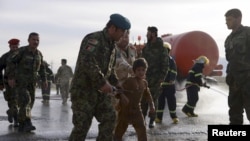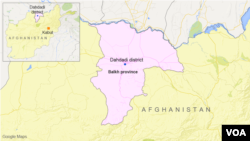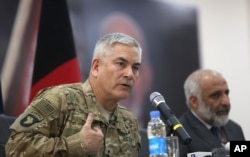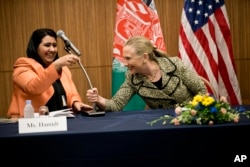A Taliban suicide bomber Monday killed at least three Afghan soldiers and wounded more than 18 others in the northern Balkh province.
Afghan officials, citing initial reports from the scene, said a bus carrying personnel of the Afghan National Army (ANA) was the target of the attack in the Dahdadi district.
Eyewitness told local reporters they saw at least eight dead among the victims. Reports said there were three women who work in the army ranks in the province among the wounded.
Claimed responsibility
Taliban spokesman Zabihullah Mujahid, in a statement sent to reporters, claimed the insurgent group carried out the bombing and gave a much higher toll. He asserted the bomber boarded the bus just before it was readying to transport the ANA soldiers to their routine duties and blew himself up.
Hours later, officials in eastern Paktika province, which borders Pakistan, said a suspected suicide blast in a crowded market killed at least six civilians and wounded nine others. Afghan media reports said the bomber apparently targeted police and intelligence operatives while they were eating lunch in Yahyakhel district.
Separately, unknown assailants gunned down a presidential palace guard in the eastern Nangarhar province. A provincial government spokesman, Attaullah Khogyani, said the security person was attacked inside his house and his mother was also wounded.
The violence comes two days after Afghanistan, Pakistan, China and the United States announced that direct peace talks between Afghan government and Taliban representatives could take place by the end of this month.
Diplomats from the four nations met in Islamabad Saturday and agreed on a road map to promote the Afghan peace talks.
Peace talks
The Taliban is not part of the four-way dialogue and has rejected the weekend announcement as a “one-sided affair” that would not produce any results.
“Foreigners are continuing their war and killing innocent Afghans,” a Taliban official requesting anonymity told VOA, adding the only solution to end the war was for the foreign forces to withdraw from the country.
But General John Campbell, commander of U.S. and NATO forces in Afghanistan, insisted there are no preconditions when it comes to talking about the peace process.
Campbell told reporters in Kabul Sunday that Afghan President Ashraf Ghani and Chief Executive Abdullah Abdullah have both already explained the way forward for peace talks with the Taliban.
“They [have] got to honor the Afghan constitution, they [have] got to honor women’s rights, they [need] to lay down their arms, they [have] got to stop their terrorist acts," he said.
"Once they do that, then we can get to the table. … But if you continue to have violence against women and children, against security forces, you have no future,” Campbell added.
Afghan civil society groups, particularly women’s rights activists, on Monday restated their skepticism and criticism of the four-way talks and the so-called road map for peace talks with the Taliban.
Speaking in neighboring Pakistan at an unofficial bilateral dialogue, prominent Afghan rights advocate Samira Hamidi complained women are completely missing in the talks the four nations have held so far and demanded their inclusion in the next meeting to be held in Kabul later this month.
Road map content
“I think it is very important to understand what this road map content is. What the negotiation is going to look like and what are the things we have to be ready for it and how we can contribute and making that this process is successful," Hamidi said.
"Because at the end of the day all we want is peace but of course peace with justice and peace with no negotiations on the rights and no negotiations on the achievements that we have had so far,” she told the delegates attending the so-called Beyond Boundaries Track Two dialogue.
The Afghan government insists it is aware of the concerns and is determined to address them in any peace negotiations with the Taliban.
The head of the Afghan delegation in the four-way talks, Deputy Foreign Minister Hekmat Khalil Karzai, promised that Kabul would stick to the “values enshrined in Afghanistan’s constitution,” particularly regarding women’s rights once the peace talks commenced.
Karzai also said the government delegation would have “a woman member in the negotiating team."







